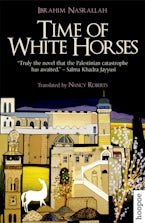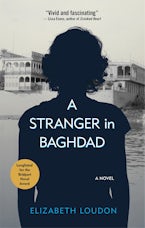- Home
- Time of White Horses

Time of White Horses
A Novel
Translated by Nancy Roberts
664 Pages, 5.00 x 8.00 in
- Paperback
- 9789774167577
- March 2016
- Region: Worldwide
LE350.00
$22.95
£24.99
- EPUB
- 9781617971754
- March 2016
- Region: Worldwide
$21.99
- 9781649032522
- March 2016
- Region: Worldwide
$21.99
Where To Buy:
Shortlisted for the International Prize for Arabic Fiction
Spanning the collapse of Ottoman rule and the British Mandate in Palestine, this is the story of three generations of a defiant family from the Palestinian village of Hadiya before 1948.
Through the lives of Mahmud, elder of Hadiya, his son Khaled, and Khaled’s grandson Naji, we enter the life of a tribe whose fate is decided by one colonizer after another. Khaled’s remarkable white mare, Hamama, and her descendants feel and share the family’s struggles and as a siege grips Hadiya, it falls to Khaled to save his people from a descending tyranny.
Ibrahim Nasrallah was born to Palestinian parents in Jordan in 1954, and grew up in a refugee camp there. He has written fourteen collections of poetry and fourteen novels as well as works of literary criticism. He is also a painter and photographer. He is the author of Inside the Night (AUC Press, 2007), Time of White Horses (Hoopoe, 2016), The Lanterns of the King of Galilee (AUC Press, 2015), and Gaza Weddings (Hoopoe, 2017.)
Nancy Roberts is an award-winning translator of a number of Arabic novels including Salwa Bakr's The Man from Bashmour (AUC Press, 2007), for which she received a commendation in the Saif Ghobash Banipal Prize for Translation, and Ibrahim Nasrallah's Gaza Weddings (Hoopoe, 2017), for which she was awarded the 2018 Sheikh Hamad Prize for Translation and International Understanding. Her most recent translation is Ibrahim al-Koni's The Night Will Have Its Say (Hoopoe, 2022.) She lives in Wheaton, Illinois.
"Nasrallah paints a vivid portrait of the idiosyncratic villagers . . . . Roberts's translation is excellent."--Peter Clark, Times Literary Supplement
"You soon realize the power of Nasrallah's novel. Any notion that this is just nostalgic reverie is dispelled . . . Nasrallah's intensely eloquent voice gives Western audiences an insight into the lives of the marginalized without rattling off numbers."--Tam Hussein, New Statesman
"Men are murdered or executed, demolitions and collective punishment meted out, ancestral lands taken at a stroke. One learns the lesson that the behavior of any oppressor is the same, regardless of time or circumstance."--Norbert Hirschhorn, Banipal Magazine
"I turned these pages with trepidation for nearly a month, sometimes holding my breath and swallowing hard. I was reading the unfolding of my own life, and the lives of all Palestinians. I knew what was going to happen and in the strange ways of a heart touched by literature, I wanted to warn the characters."--Susan Abulhawa
"[Nasrallah] conveys a powerful sense of the textures of place, time and custom . . . With the publication of Time of White Horses, lovingly translated by Nancy Roberts, our understanding of the history of modern Arabic literature has taken a giant leap forward."--Raymond Deane, The Electronic Intifada
"The measure of the greatness of this book is its humility in approaching a people's vast experiences and rituals across this long stretch of time between Ottoman and British then Israeli occupation, as Nasrallah deftly narrates this community's character within a specific locale and around the acts of the novel's hero, Khaled, whose reflections and deeds ennoble the lives of each successive generation. That Nasrallah's writing evokes this epic grandeur in discrete, alluring, lyric chapters, one story seamlessly weaving into another, is even more compelling: the long novel enlightens us in flash fictions which illuminate each other and sustain our attention."--Benjamin Hollander, Warscapes
"Time of White Horses charts the history of three generations of a Palestinian family in a small village, Jordanian author Ibrahim Nasrallah's saga is a descendant of a genre introduced into Arabic fiction by Naguib Mahfouz's famous Cairo Trilogy. Through the lives of the members of this family, Nasrallah depicts the tragedy of a whole nation under changing historical circumstances: the Ottoman rule, the British Mandate and the Nakba (the catastrophe of the Jewish occupation of Palestinian land in 1948) to the expulsion of the Palestinians and finally the post-Nakba era."--Judges Committee, International Prize for Arabic Fiction
"Time of White Horses rewrites the crisis of Palestinian representation--the simultaneous necessity and impossibility of historical narrative--in the form of historical fiction."--Karim Mattar, Journal of Postcolonial Writing
"Written in a shimmering and sensitive style, it has a captivating grip on the reader, a lasting effect on his/her sensibility and memory. This is the greatest creative portrayal which explains, through fine art, the tragedy of the Palestinian people and the causes of their disaster."--Salma Khadra Jayyusi, Founder and Director of East-West Nexus for Studies and Research and of PROTA, Project of Translation from Arabic











